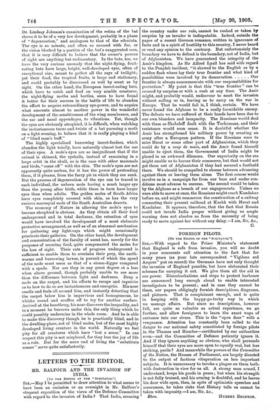LETTERS TO THE EDITOR.
MR. BALFOUR AND THE INVASION OF
INDIA.
[To TRH EDITOR OD TRH EPROTATOR."1
SIR,—May I be permitted to draw attention to what seems to have been an omission or an oversight in Mr. Balfour's eloquent exposition of the views of the Defence Committee with regard to the invasion of India P That India, meaning the country under our rule, cannot be rushed or taken by surprise by an invader is indisputable. Indeed, outside the pages of a recent German romance, written in ignorance of facts and in a spirit of hostility to this country, I never beard or read any opinion to the contrary. But unfortunately the boundary we have to defend is the boundary, not of India, but of Afghanistan. We have guaranteed the integrity of the Amir's kingdom. As Sir Alfred Lyall has said with regard to the Penjdeh incident, "it showed to the English as by a sudden flash where lay their true frontier and what kind of possibilities were involved by its demarcation Our frontier is always commensurate with our responsibilities for protection." My point is that this "true frontier" can be crossed by surprise or with a rush at any time. The Amir might, and probably would, endeavour to meet the invasion without calling us in, leaving us to carry on the war in Europe. That he would fail is, I think, certain. We have never found the Afghans to be a really formidable enemy. The defeats we have suffered at their hands have been due to our own blunders and incapacity. The Russians would deal with them as Skobeleff dealt with the Turkomans, and their resistance would soon cease. It is doubtful whether the Amir has strengthened his military power by creating an army after a European pattern. If the Russians were to seize Herat or some other part of Afghanistan, which they could do by a coup de main, and the Amir found himself unable to eject them, the Government of India might be placed in an awkward dilemma. Our superiority on the sea might enable us to harass their commerce, but that would not get them out of Afghanistan if they had secured a foothold there. We should be compelled to choose between advancing against them or leaving them alone. The first course would involve us in a campaign far from our base and under con- ditions most adverse to success. The second would be taken by the Afghans as a breach of our engagements. Unless we were able to move at once, the Russians might reach Kandahar before us, and might commence the construction of a railway connecting their present railhead at Kushk with Herat and Kandahar. It appears, therefore, that the fact that Russia could not invade India proper without giving us ample warning does not absolve us from the necessity of being ready to move against her without any delay.—I am, Sir, &c.,






































 Previous page
Previous page